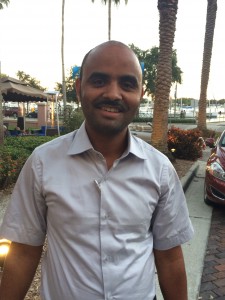 Here are highlights of an interview with Aman Sisay, executive editor of the Ethiopian Business Review and one of 12 African journalists getting three days of training at the Poynter Institute for Media Studies.
Here are highlights of an interview with Aman Sisay, executive editor of the Ethiopian Business Review and one of 12 African journalists getting three days of training at the Poynter Institute for Media Studies.
Did you enjoy the first day of your program at Poynter?
It was very exciting, educative and informative. It showed me where media is heading. Most of the things we saw today are not happening in my country; it was a very good look at the future. This training really gave me ideas about how to use new methods and was simple and practical.
I want an interactive platform for my magazine, Ethiopian Business Review, and this gave me a lot of information. It is a simple training that can make a big difference.
What does participation in the Murrow Program mean for Ethiopia and other African countries?
Well, it is a great opportunity; it will help us serve our nation and empower our audience. We are very thankful to the people and government of the United States for giving us this wonderful chance.
What is the big difference in journalism between Ethiopia and the United States?
In my nation, we are in transition. Freedom of the press is only two decades old, and we are limited compared to other African countries. There are two problems.
We have restrictive laws. A journalist could be charged for treason if anything is written that could be interpreted as supporting or promoting outlawed political parties by the government. Also, a journalist can be charged as a terrorist if (he receives) any communication, for that matter receiving a newsletter, from such political parties. The government can have broad, extended and subjective interpretations of laws.
Also, we don’t have good, professional schools for journalism. If the media gets things wrong, the government will not tolerate.
Right now, the government is not giving enough space to the media, particularly to those writing political issues. When politics gets better, the media will get better.
Do you worry sometimes about the consequences of stories you put in your magazine?
No, not really. We write about economic and financial issues, not political situations.
What was your reaction to USF St. Petersburg’s decision not to host the Murrow Program this year due to fear of Ebola?
I was surprised. The nearest affected country, Liberia, is more than 5510 kilometers (3,424 miles) away from Ethiopia. There are no reports of Ebola in Ethiopia or even neighboring countries.
Would you have been nervous if the journalists from Sierra Leone and Liberia (two countries hard hit by Ebola) had participated in the Murrow Program with you? (Their visits were delayed by the State Department.)
I would have been a little nervous, but would trust the United States screening system.
I was screened when I left Ethiopia and I will be screened when I return. Ethiopia and Algeria want to be very well prepared in the event of further spreading of Ebola. Ethiopia has a 24-hour hotline for people to call with questions and concerns.


